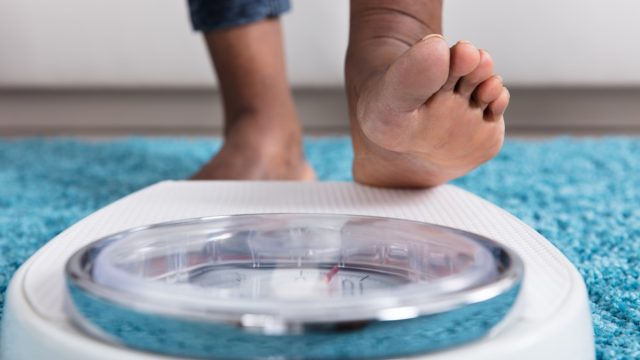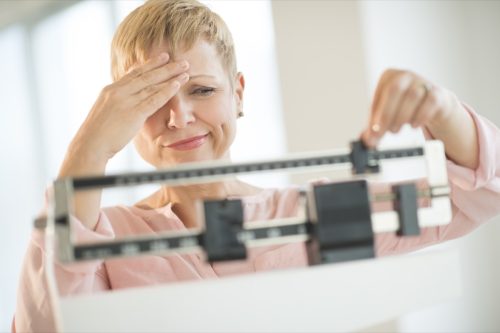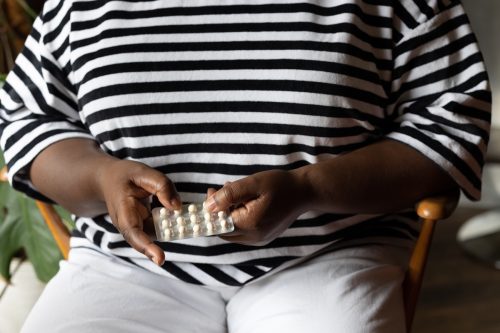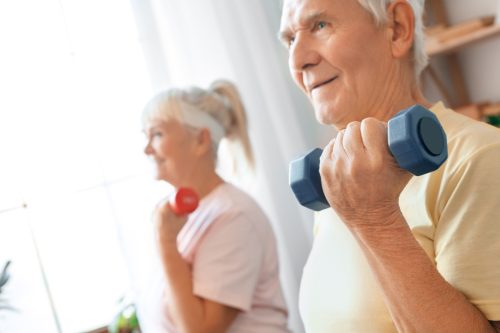Your Hormones—Not Your Diet—May Be Making You Gain Weight, Doctors Say
Poor eating habits and lack of exercise aren't always to blame.

Eat less, move more. If we only had the discipline to do that, we'd all look as good as Jennifer Lopez does at 54. Right? But we don't all have JLo's discipline or body (or very few of us do, anyway). More than 40 percent of U.S. adults are obese, according to the National Institutes of Health, and more and more of them are turning to medication to try and move the needle on the scale.
Are we all lazy and addicted to Krispy Kreme doughnuts? Of course not. Then why have the hundreds of fad diets and fat-burning workout programs that promise speedy weight loss failed so miserably to keep us lean? The answer is more complicated than you may think. Read on to find out why your hormones, not what you eat, could be sabotaging your weight-loss goals—and what you can do about it.
READ THIS NEXT: If You Notice This on Your Nails, Get Your Thyroid Checked, Doctors Say.
Our metabolism changes as we get older.

If you're over 50 and notice the number on the scale creeping up in spite of your diet and exercise efforts, rest assured that you're not alone.
"As we age, particularly women, we hit a wall; our hormones begin to change and our metabolisms slow down and we start putting on fat," says endocrinologist Florence Comite, MD, the CEO of Comite Centers for Precision Medicine & Health. "By the time we hit our 50s and our [menstrual] cycles stop, it's very hard to lose weight."
You can ask your doctor to test your hormone levels.

If you're struggling to shed pounds, it's a good idea to ask your healthcare provider for a thorough work-up, including testing your hormones. Comite says doctors rarely test for hormone levels because little is taught about balancing hormones in medical school.
"When your hormones shift, that can undermine your sense of well-being and may lead to disorders of aging like weight gain, diabetes, low-bone density, heart disease, and Alzheimer's," she explains, noting that women should have their progesterone and estrogen levels, as well.
Building muscle helps boost your metabolism.

So if we're over 50 and want to lose weight, what can we do? Weight-training is one way to maintain your youthful figure, Comite says.
"Muscle is like the fountain of youth," she explains. "It keeps you young and healthy. It's the main protection for your bones and your immune system, but it declines with each passing year unless you take action to reverse it."
For more health news sent directly to your inbox, sign up for our daily newsletter.
Hormone supplementation may help, too.

Another possible way to maintain a health weight? Hormone supplementation. "Consult with a qualified specialist like an endocrinologist, gynecologist, or other qualified clinician to explore if hormone supplementation is right for you," suggests Comite.
"Supplementing with the hormones estradiol, testosterone, and progesterone will contribute to rebalancing your health," she says. And while testosterone is yet to be approved for use in women, Comite notes that "it is essential to sustain muscle, lose fat, and improve libido."
Diet and exercise can help you lose weight, even if your hormones are out of whack.

The proper combination of diet and resistance exercise can really help you slim down, says Comite, who suggests a combination of regular strength training, eating a balanced diet, and plenty of protein to keep your body functioning at its best. She suggests eating 1.6 grams of protein per kilogram of your body weight each day.
"By [rebooting our metabolism], we can reverse diabetes. We can stop heart disease in its tracks. We can reverse aging, your biological age, so you become more youthful even as you blow out more candles on your birthday cake," she says.





















